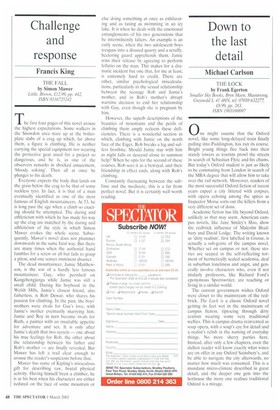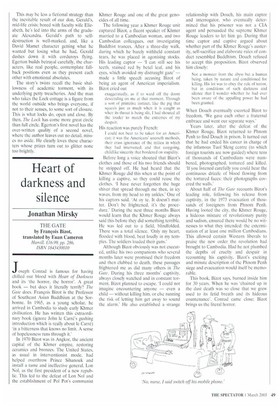Down to the last detail
Michael Carlson
THE LOCK by Frank Egerton Smaller Sky Books, Bryn Maen, Maentwrog, Gwynedd L 41 4H1V, tel: 07050 632277, 18.99, pp. 283, ISBN 1903100097 0 ne might assume that the Oxford novel, like some long-delayed train finally pulling into Paddington, has run its course. Bright young things flee back into their stately towers as tourists prowl the streets in search of Sebastian Flyte and his chums. But today's Oxford student is just as likely to be commuting from London in search of the MBA degree that will allow him to take over the rail network. Moreover, readers of the most successful Oxford fiction of recent years expect a city littered with corpses, with opera echoing among the spires as Inspector Morse sorts out the killers from a very different set of dons.
Academic fiction has life beyond Oxford, unlikely as that may seem. American campus novels, like Jane Smiley's Moo, show the redbrick influence of Malcolm Bradbury and David Lodge. The writing known as 'dirty realism', first labelled in Granta, is actually a sub-genre of the campus novel. Whether set on campus or not, these stories are seeped in the self-reflecting torment of hermetically sealed academia, deal in suburban loneliness and angst, and generally involve characters who, even if not titularly professors, like Richard Ford's eponymous Sportswriter, are teaching or living in a similar world.
The current government wishes Oxford were closer to the mainstream of the redbrick. The Lock is a classic Oxford novel getting its feet wet in the mainstream of campus fiction, tiptoeing through dirty realism wearing some very traditional wellies. This is campus drama reinvented as soap opera, with a soap's eye for detail and a realist's relish in the naming of everyday things. No more sherry parties here. Instead, after only a few chapters, even the dullest reader will know exactly what wines are on offer in any Oxford Sainsbury's, and be able to navigate the city afterwards, no matter how much was consumed. This is a mundane micro-climate described in great detail, and the deeper one gets into the hothouse the more one realises traditional Oxford is a mirage. This may be less a fictional strategy than the inevitable result of our don, Gerald's, mid-life crisis: bored with faculty wife Elizabeth, he's led into the arms of the graduate Alexandra. Gerald's path to selfdestruction is well-marked, and, like a David Matnet character getting what he wanted but losing what he had, Gerald dashes down it with corduroys flying. Egerton builds betrayal carefully, the characters, like real people, contemplate fallback positions even as they present each other with emotional absolutes.
The story's twists recall the basic shallowness of academic torment, with its underlying petty treacheries. And the man who takes the Lock cottage is a figure from the world outside who brings everyone, if not to their senses, to some sort of closure. This is what locks do, open and close. By then, The Lock has come more great circle than full circle. Egerton's first novel has the over-written quality of a second novel, where the author leaves out no detail, misses no aside. He clearly loves these characters whose prizes turn out to glitter none too brightly.



















































































 Previous page
Previous page